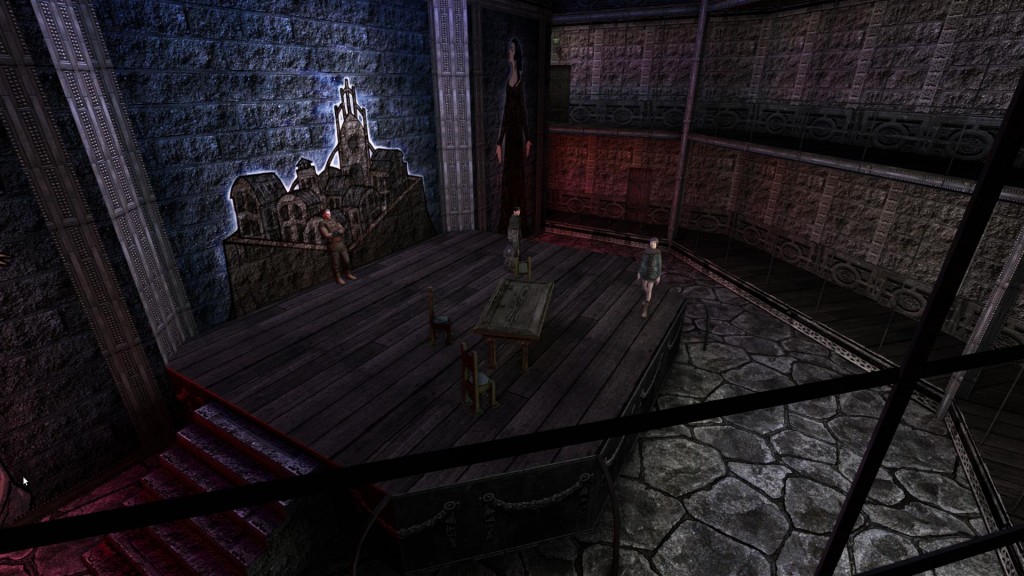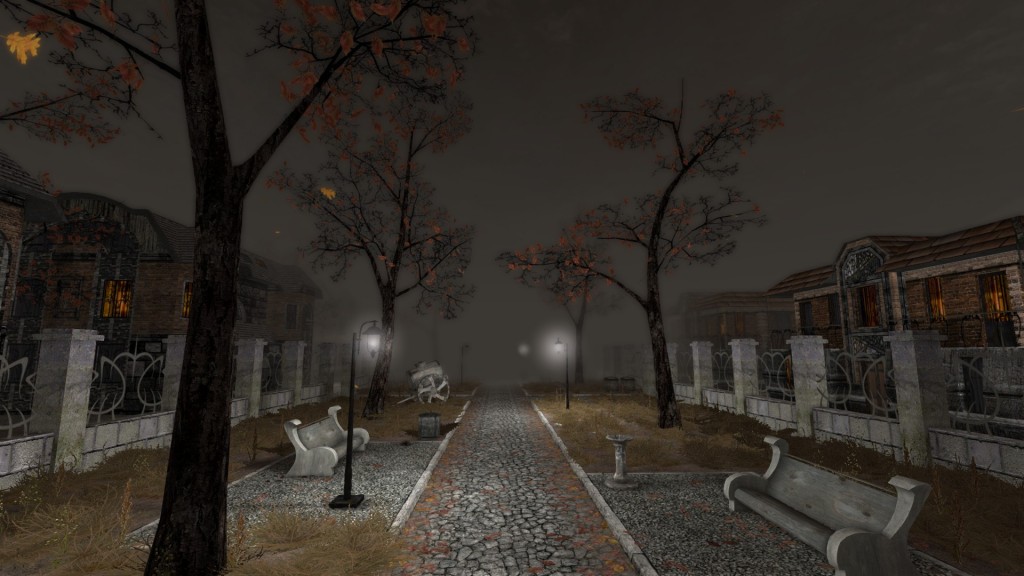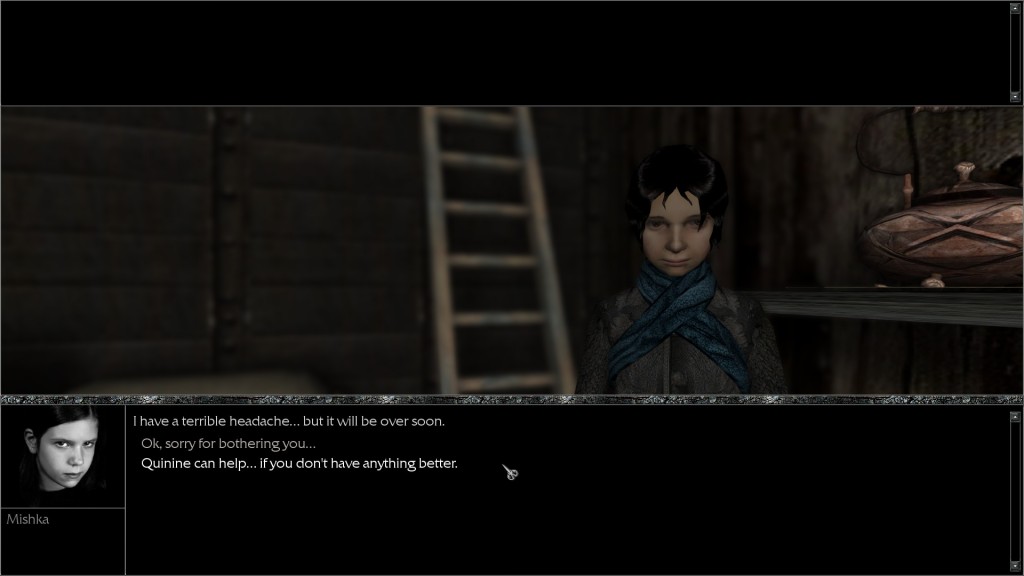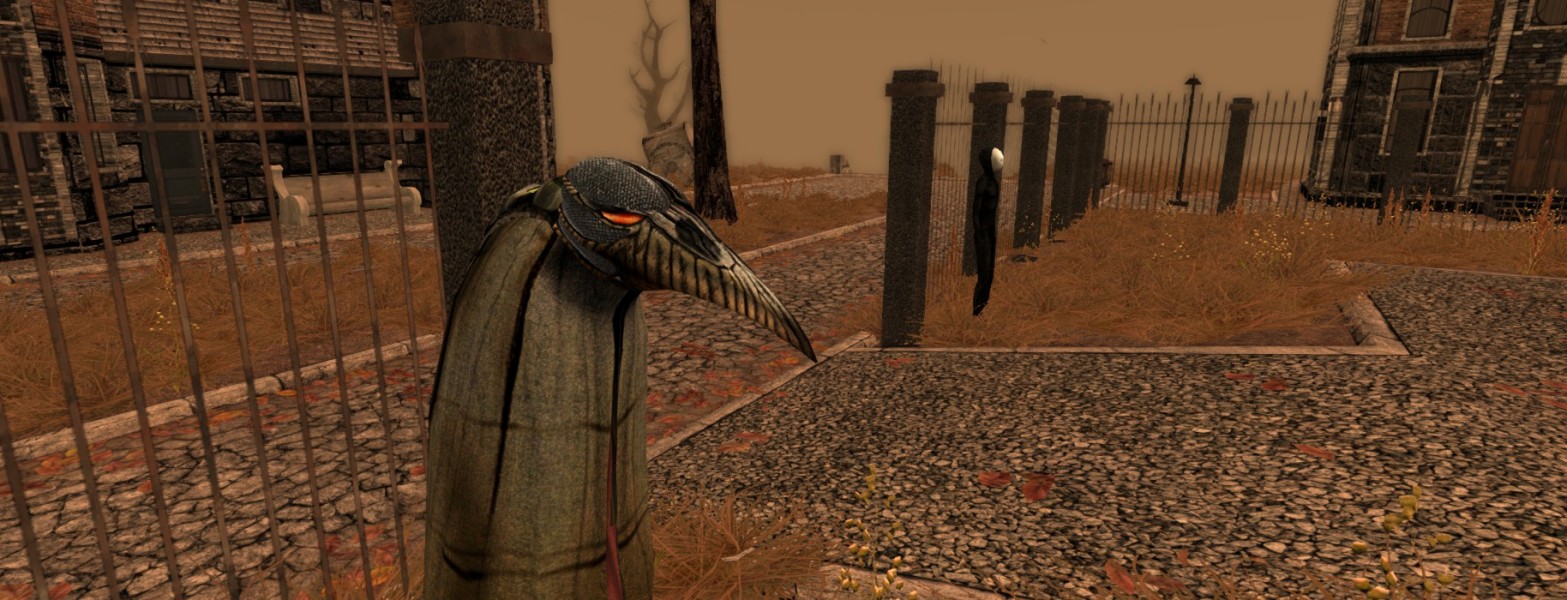Boredom is usually considered to be the death of a game. You play, you get bored, you switch off. Popular thought demands that videogames be engaging at all times, whether through direct action or intellectual thrill. It matters less as to how it’s achieved as long as boredom is avoided. But Pathologic, a game by Ice-Pick Lodge released in 2005 but re-released in HD last year, goes against this thinking—it forces its players to get bored and for good reason.
Pathologic is a game about an epidemic. However, it does not follow the clichéd narrative of a crisis revealing the most extreme aspects of human nature. On the contrary, this crisis reveals the void lying at the very core of human existence. The means of unearthing this void is a tedium that is felt at all levels of the experience. The game does not tell a story about boredom accompanied by engaging challenges and goals. Nor does it tell an epic story of great exploits while the player has nothing to do. It uses boredom consistently and consciously.
The first void is the one through which we experience the game world, the void of the avatar. I observe the world from the first-person perspective, and at no point can I actually see my virtual body as all the mirrors in the game are broken. This simple fact has one serious consequence. If I don’t see my body then how can I be sure of who I am? I can’t. However, I can reason that I am myself, because other people address me as if I am myself—outside of this, when there is nobody to affirm my identity in the game, I basically have no identity. But what if they tell me I am somebody else, two people at the same time or, even worse, simply nobody? My lack of identity is exposed in this possibility and I realize that I am just an empty form. I have to rely on the exchange of language to affirm that I am myself but the same language can be used to expose the void lying under this brittle self. Pathologic is ruthless in this respect. It stacks up its themes of duplicity: twins imagined into existence, mistaken identities, avatars as theatrical characters—as well as references to the reality of “the player”—all to make me constantly doubt who I am in the game.
Most videogames tend to mask the fact that the avatar is a void, but Pathologic exposes it. In most games my avatar is identified mostly by what they do; a utility for me to interact with a virtual world. And so their identity is synonymous with their actions. If it’s a first-person shooter then that identity is of a shooter—in a shooter, I shoot, therefore I am. My avatar exists for the sole purpose of pulling the trigger, and if there were no gun, then by this logic there would be no avatar, and no game world either as it exists simply as a space to shoot in.

Pathologic is not a shooter. It is literally a role-playing game. It is an explicitly theatrical game about delivering lines. The avatars, just like the characters, exist only for the purpose of speaking and being spoken to. That much is clear. But what about when there is silence? It is deliberately boring. I simply walk from one place to another. There are some obstacles, but they provide no tension, only frustration through repetition. I can stock up on ammunition, immunity pills, and protective clothing, so that I don’t have to care about these stoppages; or I can give in to constant repetition and find the same effect in my apathy. And when I walk, and walk, and walk, the tedium of it brings me to a singular realization: I am meaningless and the world is indifferent to me. I only mean anything in this virtual world when I talk or when I walk towards a place where I will engage in conversation. But walking itself doesn’t make things happen, it doesn’t change the world, it serves no other purpose. Pathologic would be a much less boring game if I didn’t have to walk. But this boredom isn’t a flaw. On the contrary, it is crucial, as it encourages me to observe the world and get familiar with its sights and characters. As I trudge up and down I start to see signs that help me learn this world at a deeper level. It may be indifferent to me but I can engage with it through these signs; the world has to be learned like a language.
Besides forcing observation, Pathologic’s tedium brings attention to the fact that my avatar has a body with its own needs. While I walk, this virtual body gets tired, and when it’s tired it must sleep. But sleeping takes time. And time in the game passes unusually. Typically, a game that draws attention to the the passage of time does so to imply a shortage of time; in Pathologic, however, there is often too much redundant time. Walking along the dusty paths is akin to dragging myself across a timeline. As with the avatar’s body, which uses exhaustion to make me aware that it is not a tool I can fully control, the boredom of experiencing time ticking slowly makes me aware that my actions do not matter.
///
My entry into Pathologic is a step into a foreign system of signification. There is nothing for me to do here except to walk in tedium until I learn the town as a language. I have to know what my surroundings mean and how they connect before having any possibility of moving on. But I can’t do that without acquiring meaning myself—I have to become inscribed into this system of signification. The only other choice is being a non-entity, a bored shadow walking. The first step is to explore the question of how the game world is made to signify. The answer is simple: nature signifies through mythology and civilization signifies through architecture.
Mythology plays a crucial role in the universe of Pathologic. And yet, Pathologic is not a fantasy game. Most popular fantasy games simply neutralize the fundamental tension between the real and the imaginary, between experience and belief, between the present and the absent. Fantasy games are mostly about escapism into a world where there is no mystery and no need for sense-making, since everything is rendered equally real. Pathologic, on the other hand, exploits that tension to its utmost. When I enter this world, I am struck by an uncanny sense of alienation. I cannot make sense of this town because it does not match my conventional ideas about both real and virtual worlds. I have to take time to learn it, as I cannot rely on the acquired vernacular common in other videogame worlds to navigate this territory. I have to modify these ideas in order to learn the town. It is I, the player, that has to make the effort and change my way of thinking. Paradoxically, there is not much of the unreal about the reality of the game; I realize that hypothetically a town like this could exist. And yet, if I were to try to pinpoint the possible location of this place in the real world, I would be at a loss.

In this town, the train station and the Abattoir—the grotesque industrial Molochs devouring goods and people—neighbors altars and the yurts of half-human herb-gatherers. In this town, modern antibiotics, gas stoves, and denim jackets coexist with blood elixirs, ritual fires, and twisted bird masks. Pathologic does not simply resort to the fantastic for me to naturalize it as I overcome its initial unfamiliarity; it uses my very expectations of realism to subvert them from within. To experience this reality, I first have to lose any expectations I bring in from outside of it. With that done, my only choice is to make sense of the world and of the epidemic by getting to know the local lore. The lore here is not merely an appendage to the player-centered main story, but the very essence of the experience. Early in the game, I realize that locals have an animistic system of beliefs, in which everything in the world has a meaning. However, this is not a coherent system, and I am not its superior discoverer, the seeker of the ultimate truth. This system is based on contradiction and polysemy, to which I have to submit myself. For instance, I have to accept the many meanings of the earth in Pathologic: the earth is both the mother and the father of the entire universe, known as “the bull” in the game. The earth gives life and takes it away. The earth contains both healing and infected blood. The earth is the possibility of the human; but it is also the source of human alienation from the world and the futility of human aspirations. But the earth is not my playground. The game world has to be learned but, paradoxically, cannot be fully understood. Understanding is always partial, as it reduces the complex texture of signification to one easily discernible thread, when in fact there are many and they often oppose each other. Pathologic is about accepting the town as a system of signification with all its internal contradictions. It is not up to me solve them. If I try to play the all-knowing detective, I will only come to the false conclusion that the game makes no sense. On the contrary, it is overbrimming with sense to which I have to adjust my thinking. If I don’t, there is nothing for me to do here.
///
Pathologic emphasizes the presence of its architecture through, firstly, its thematization, and secondly, by introducing the architects. One of the most important structures of the game is a tower called the Polyhedron. The tower connotes the superhuman as, allegedly, it can preserve dreams and even human spirits in their pure state. And yet this concept of the superhuman is not the opposite of the natural world. They are synonymous.
This merging of contrary terms is achieved by aesthetic, narrative, and intertextual means. The tower can be perceived as both an insect—vying for spiritual supremacy with the neighbouring spider-like church—and a bird. It seems to have been inspired by one of 20th century German painter Unica Zürn’s drawings. But within the game world the bird is not just an animal; the bird, mostly, acts as a disguise for a human actor. Zürn’s drawing does not just represent the bird—it is, just like the Tower, a composite illusion whose exact form and substance cannot be grasped. The bird’s beak sprouts some sort of a plant. At one point I discover that the tower is rooted in the ground just like a plant. As suggested by some drawings in the game, people are also considered to be plants; and plants, in turn, are treated like people. The superhuman Tower planted in the soil connects with the opposite end of the town, tellingly called Earth.
The town, seemingly dichotomous, is actually circular. Just like the organism of a bull that its topography represents (which, apparently, alludes to another drawing by Zürn), with all elements of the system being connected by one bloodstream. Disparate terms come to interact in a polymorphous game of signification; as if different organs serving a single body. In this, language is no longer merely a human tool for ordering reality. On the contrary, language becomes reality itself, in which humanity is just another term to be merged with its supposed antonym, nature. There are only two possibilities: to become a part of this language or exist in empty tedium.
///
In any game, I can act only through the language given to me. This is usually an action. In Pathologic it is speech. Without it I am nothing. When there is nobody around to affirm my identity or give meaning to my actions, I realize that I, as my avatar, do not have an autonomous self. My actions lose sense and therefore become futile. Out of this comes boredom and that serves as an expression of emptiness—when I am bored, I may as well not exist. Most games avoid reaching this realization by constantly serving the purpose it has given me: when I am a soldier, I have enemies to shoot; when I am a spring-legged mammal, there are platforms to jump across. I have only one meaning and I don’t need to question it. However, when a game such as Pathologic openly tells me that I am simultaneously myself in the real world, somebody else in virtuality, and nobody at the same time, while making me do purposeless or contradictory things, I start to see how my virtual identity is determined only by language. It is the words used to describe me and my actions that give me meaning at any time. Without that language, there is only pure boredom, a void where there is nothing to do. The characters in Pathologic cling to language as it’s their way of discovering an identity for themselves in a world that refuses to give them one. One of the dominant identities is found in mourning. But it’s not true mourning, it is a state the characters force themselves into in order to have something to do amid the boredom—to have a semblance of identity. It is in this state of mourning and not-mourning that emerges the many contradictions of language in Pathologic.

When I arrive in the town, I learn about the death of Simon Kain who, up to now, had been considered immortal. The Kains epitomize the contradiction between the spiritual and the carnal. On the one hand, their talk revolves around immortality, pure life; on the other, they are alive only in death. Two of the Kains are dead. The other members of the family gradually come to embody the spirits of the deceased. At some point, one of them delivers an odd statement, saying that there is more life in her than she can live. Turns out that this life she refers to is not hers, it is the life of her dead mother; for the Kains, life is synonymous with death. This is how obsessed they have become with pursuing an identity through mourning. Not only do they embody the dead, they also want to extract and preserve their spirits in their pure form—for the Kains, doing so would be to achieve an immortal identity. But they cannot achieve this entirely as the presence of Simon’s body cannot be refuted. In the game, he becomes the town’s life force as his blood is turned into vaccine. This blood, considered superhuman, is similar to the blood of a bull, the animal father who is the earth. Simon, the immortal superhuman, thus, merges with the earth, and the immortal merges with death.
Some other characters also mourn with an incestuous devotion which leads them to assume the role of the deceased and, in one case, the role of death itself. By the end of the game it may be revealed that even the town’s law-givers are children returning from their grandfather’s funeral, and the plague is just their game. They cannot accept the fact of their grandfather not being there so they create a game to express this. But since no absence can exist in its pure state, this game they come up with resorts to the most irrefutable presence available, the presence of rotting flesh. Just like the Kains, the children want their grandfather to exist in the transcendent form of a pure spirit; but they cannot deny the presence of his flesh. And so, the plague can be said to result from the irreconcilability of the now absent spirit, which is present only in language, memory, and the remnants of the physical body. The mourning characters in Pathologic assume the role of the dead to such an extent that they lose their identity and themselves become dead bodies existing in constant tedium.
In the world of Pathologic, mourning with devotion and assuming a role are synonymous. The characters are devoted to their positions as mourners assuming the roles of the dead because there is nothing else to be devoted to. As already mentioned, Pathologic uses the RPG convention of incessant dialogues to show how language determines, or even substitutes, identity. The plot proceeds mostly through talking. The genius of Pathologic consists in the realization of the theatrical nature of such a device. I am constantly presented with the possibility that I am just taking part in a play. Can it be said, however, that the characters of this play are actors? No, because actors have their own identity; the characters have nothing but a role, which they use as a substitute for identity. Hence, they have to express emotions they do not feel, narrate situations which never really took place, and refer to things which exist only as a part of the play. Their curse lies in the realization of this fact. This is the curse of self-awareness deprived of the self. The characters would like to find a true language to express their own position within reality but cannot, as there is no reality apart from theatricality. That is why they have to repeat words which are not their own, usually the words of the deceased. They become bored when they cannot act (in either sense of the word), and so they have to wait in an empty tedium for the time to say their lines.
///
The disease in Pathologic does not come from the outside. It is the disease of irresolvable contradictions within the same system of signification. This is the curse of language made flesh. The disease is the presence of the absent, the embodiment of the disembodied, the life of the dead. That is why this disease cannot be contracted. It is the consequence of existence as a part of the town. In order to make me enter this structure, the game makes me bored. By making me bored, it makes me realize the fact many games tend to hide: that the world does not belong to me.
